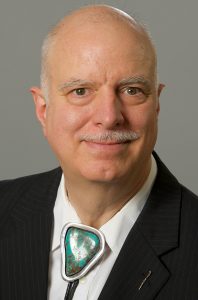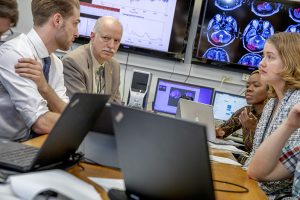By Wayne Gillam | UW ECE News

UW ECE alumnus Donald Wunsch II (Ph.D. ‘91). Wunsch has been named by IEEE as recipient of the 2023 Computational Intelligence Society Neural Networks Pioneer Award for fundamental contributions to the understanding and development of neural networks. Photo by Bob Phelan | Missouri S&T
This month, UW ECE alumnus Donald Wunsch II (Ph.D. ‘91) will receive a high honor from the Institute of Electrical and Electronics Engineers, commonly known as IEEE. Wunsch has been named by IEEE as recipient of the 2023 Computational Intelligence Society Neural Networks Pioneer Award for his fundamental contributions to the understanding and development of neural networks — computing systems inspired by neuroscience. Neural networks have many applications today, ranging from image processing and speech recognition to financial forecasting and medical diagnosis. Wunsch will receive the IEEE Pioneer Award at the International Joint Conference on Neural Networks, which will be held June 18–23 in Gold Coast, Queensland, Australia.
“When I graduated from the UW with my newly-minted doctoral degree, I saw the IEEE Neural Networks Pioneer Award as an impossible dream,” Wunsch said. “But it was the combination of my education at the UW and my work at Boeing that laid the foundation for my path to receiving that same award today.”
After receiving his bachelor’s degree in applied mathematics from the University of New Mexico in 1984, Wunsch moved to Seattle to work as an engineer at Boeing while pursuing his graduate studies. He received his master’s degree in applied mathematics in 1987 from the UW and his doctoral degree in electrical engineering in 1991 from UW ECE (then UW EE). His work at Boeing culminated in a role as a senior principal scientist for the company’s research and development group. In 1993, Wunsch left Boeing to accept a position at Texas Tech University as an assistant professor of electrical engineering, and in 1998, he was promoted to associate professor. In 1999, he joined the electrical and computer engineering department of the Missouri University of Science and Technology, where he has held several notable appointments and garnered many awards and honors over the years.
“Neural networks ‘clicked’ for me the moment I encountered the topic at Boeing,” Wunsch said. “It combined the novelty and fascination of artificial intelligence with the engineering practicality of solving real-world problems.” He went on to add, “When I joined UW EE in 1987, it immediately felt right, similar to how I felt about starting neural networks research in 1985. The UW’s high standards of teaching and research, the outstanding peer group, and superb mentoring by many faculty members (especially Bob Marks, who was my adviser) created a fantastic environment for me to realize my dreams.”
When I graduated from the UW with my newly-minted doctoral degree, I saw the IEEE Neural Networks Pioneer Award as an impossible dream,” Wunsch said. “But it was the combination of my education at the UW and my work at Boeing that laid the foundation for my path to receiving that same award today. — UW ECE alumnus Donald Wunsch II (Ph.D. ‘91)
Today, Wunsch is the Mary K. Finley Missouri Distinguished Professor of Electrical and Computer Engineering at Missouri S&T. He is also the founding director of the Kummer Institute Center for Artificial Intelligence and Autonomous Systems and director of the Applied Computational Intelligence Laboratory at Missouri S&T. Wunsch is an IEEE Fellow, an International Neural Networks Society (INNS) Fellow and recipient of an NSF CAREER Award. He served as INNS president in 2005 and received the organization’s Gabor Award in 2015 and Ada Lovelace Award in 2019. Over his career, Wunsch has produced more than 500 publications, including 12 books.
In 2021 and 2022, Wunsch served as a program director in the National Science Foundation’s Energy, Power, Control and Networks program. He noted that during his time at the NSF he witnessed the UW and UW ECE contributing research important to the development of machine learning, neural networks and artificial intelligence.
“In my recent rotation as an NSF program director, I enjoyed seeing the ascendancy of the current wave of exceptional researchers at the UW, some of whom were in my grant portfolio,” Wunsch said. “It’s thrilling to see how robustly the UW is advancing, despite the many challenges facing higher education institutions today.”
Building a foundation for the future of artificial intelligence

Wunsch (second from left) with Missouri S&T faculty and staff. Clockwise, from left to right: Research Assistant Blaine Allen, Wunsch, Associate Professor Tayo Obafemi-Ajayi, Professor Gayla Olbricht. Photo by Tom Wagner | Missouri S&T
In naming Wunsch the award recipient, the IEEE noted his contributions to two specific types of machine learning — reinforcement and unsupervised learning. Reinforcement learning enables a machine learning agent to perceive and interpret its environment, take actions, and learn through trial and error. Unsupervised learning uses machine learning algorithms to discover hidden patterns or data groupings without the need for human intervention. Wunsch’s research has focused on both reinforcement and unsupervised learning, as well as hardware and applications for neural networks. He noted that when he began studying neural networks, predictions for this new field were mostly inaccurate.
“Back then, proponents of the field claimed that neural networks would lead to collective, emergent, self-organizing capabilities for artificial intelligence,” Wunsch said. “Its many detractors said that the field would die unless it delivered applications that made or saved money on real problems. After a few years, it became apparent that the field was wildly successful by the standards of its critics, but even today it falls far short of the goals of its proponents.”
Wunsch went on to explain that when a researcher or organization achieves a new level of success with neural networks, they are all too likely to claim that they are on the verge of achieving artificial general intelligence — a machine intelligence on par with human intelligence. Wunsch asserts that scientists and engineers are still quite a way out from that level of accomplishment; however, he noted major milestones in the field, such as image analysis, AlphaGo, big data analytics, and protein folding software, as examples of real breakthroughs. He remains optimistic that, going forward, we will continue to see artificial intelligence achieve new capabilities that previously were thought to be much further away.
“To an engineer, there’s more than enough to get excited about in this field without indulging in excessive hype,” he said. “What I tell new students is that there are plenty of contributions to make for you, your children, your grandchildren and beyond. Advances in algorithms and hardware will be equally important in this process, and both will change radically from the approaches that are dominant today.”
Wunsch emphasized that it was his time at UW ECE and the UW, in addition to his work at Boeing, that helped to form the basis for his success. He also believes that the UW is providing a firm foundation for the next generation of engineers specializing in machine learning, neural networks and artificial intelligence.
“The students, faculty, staff and all stakeholders of the UW are lucky to have such a jewel of an institution, which itself is very lucky to have attracted a committed base of supporters to allow it to achieve a legacy of lasting excellence,” Wunsch said. “Future giants in many fields are at the UW right now. And it is this amazing community at the UW that will help them get there.”
Learn more about Professor Donald Wunsch II and this award on the Missouri S&T website.

